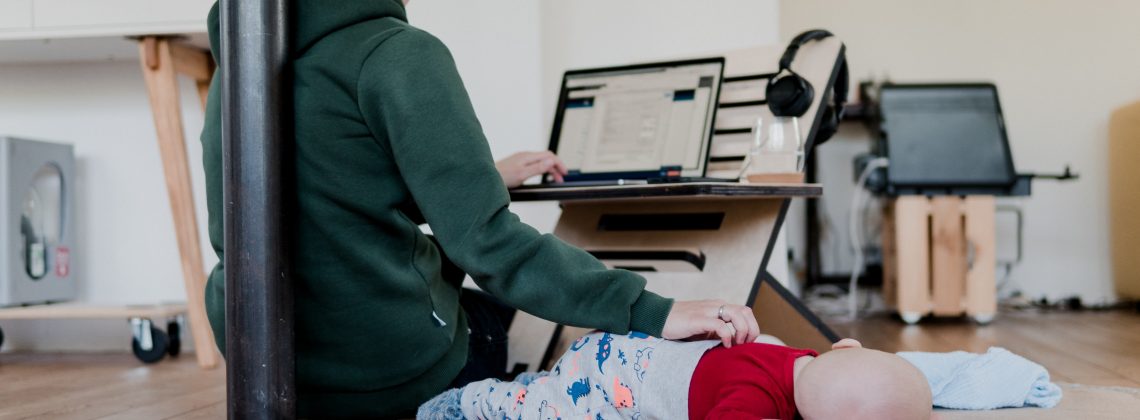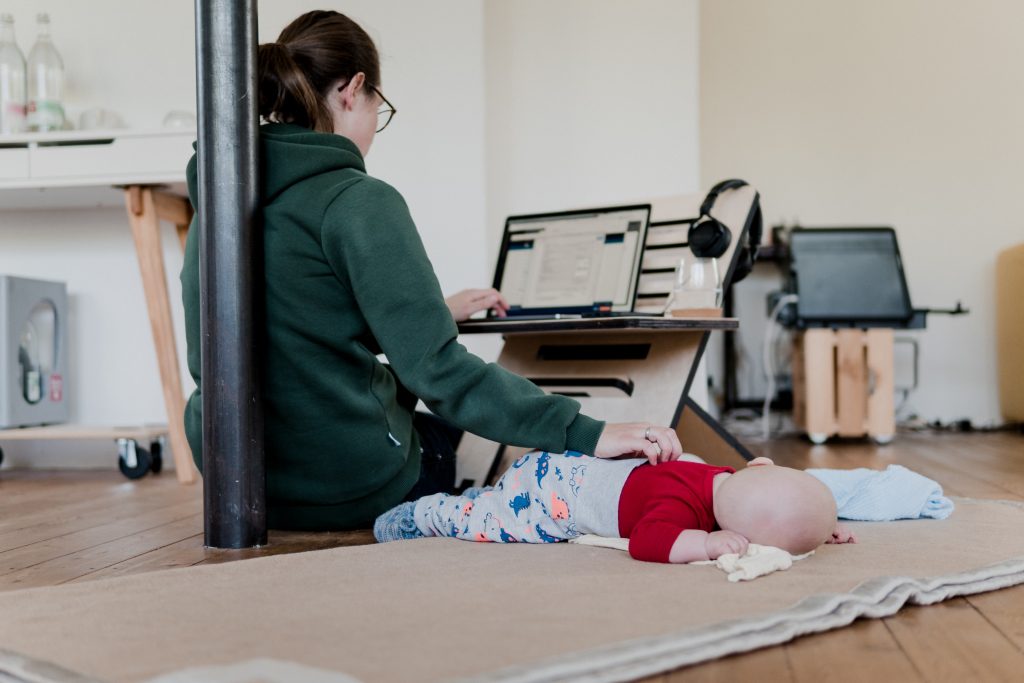

The pandemic has left us with some work to do—including rethinking the relationship of work to care
If Covid-19 hit America’s economy and work rhythms hard, it was especially cruel to working moms. Some women lost jobs altogether and with them long term prospects of promotion, experience, and savings. Some women held on to jobs as “essential workers,” a title paying lip service to their importance without reflecting it in status or pay. Some had the comparative luxury of working from home—”WFH” as part of the “new normal”—while also being tasked with remote schooling. Covid delivered few work-life benefits. But the extremity of these dislocations could prompt a fruitful rethinking of work and family.
The system needed dislocating. Old ways of dividing job and home duties for men and women were off kilter. Patterned by separate spheres long since blurred, nineteenth- and twentieth-century expectations had men working for wages while women managed households. Some benefited in this system—not least employers who, as Heather Boushey argues, got the American Wife as the silent partner who enabled the American Worker to clock-in reliably.
The workforce women entered in new capacities in the 1980s still presupposed employees without care duties. Moving women’s livelihoods from marriage to the market stripped value from work done at home. Some applauded women’s advances without weighing implications for home life or making the structural shifts necessary for working motherhood. These oversights became all too obvious in decades of arguments over the “second shift” and “work-life balance,” complete with their pitched battles over “mommy tracks” and “having it all.”
In recent years work and parenting standards have simultaneously gotten even more intensive. The arrangement was not good, but women lived with it, teetering up to March 2020. Then the world changed.
When it did, women were slammed. Living through the pandemic working from home or unemployed with kids out of school was not just “hard” or “hard to manage” but nearly impossible, due to a raft of demands stretched between childrearing and income-earning. The New York Times published a whole section on women’s “primal scream.”
The problem rightly calls for social policy redress. But these voices are saying far more: No one has the right to expect all this of me. Flourishing adulthood should not look like this. As policymakers seek solutions, the right question is not just what women need in order to get back to work but how, for the purpose of human goods beyond productivity and salary, to put work in its place for men and women alike.
Our economy—what it makes, what it trades, how it is regulated—shapes how we work. But how we think about work also shapes what we do and how we earn. Praising child allowances, Leah Libresco Sargent observes that “when children and work come into conflict, work usually wins.” It does not win simply because business buys the victory; it wins because we invest so much of our own value into it. We shape our educational system and aspirations for our children around it. Parceling our hours into work-days and weekends ill serves the worthy material that might fill a life, not least our responsibility to dependents, neighborhoods, congregations, and other institutions. Absent another ethos or telos to describe what life is for, we often enough let work (or consumption enabled by work) define us and our priorities. This is problematic on two fronts.
First, prioritizing a job as the focus of life derogates the real work we do in our households. Sure, any time spent with family can be fun. But many things we do with and for family members are better seen not as fun but as cooperative work. Efforts to take such service seriously by calling it “care work” have merit, peeling off the sentimentality that depresses the work’s value by assuming it’s just done for love. Note, though, that this corrective has risks too—it elevates and denigrates at once what childcare or eldercare entails. While we certainly hope love motivates this care, we can respect it without denying how tedious, strenuous, and thankless caretaking can be.
Early twentieth century reformers knew that in order for women to do other things—like pursue education or enter professions—they had to find some solution for home duties, not only childcare but the responsibilities of feeding and supplying and keeping clean. As Dolores Hayden narrates in her study of “material feminism,” women experimented with cooking communal meals, trading chores, and employing teams to fulfill domestic tasks because they knew all this still had to get done. For the most part, we have rejected their solutions, wishing the problem away or making shoddy compromises: overloaded moms outsourcing things individually and irregularly to the gig market, where poorly paid people service bodily needs of richer people. Like Hayden’s domestic revolutionaries, we do better to take seriously the doing of housework and family nurture.
Second, building life around work rather than the reverse costs too much. By forcing into the home the work that used to reign outside, WFH reminds us that the household should frame work rather than function as its handmaiden. Arguments against life-as-work are building steam, fueled not only by the pandemic but by growing dismay over dead-end jobs, gigged-out sectors, and inequality. You, Toni Morrison assures, are not just your work. Demoting ourselves from the status of prestigious jobs, or raising us from the stigma of unglamorous ones, helps us build solidarity. The gap between brain surgeon and plumber is narrower when they meet not by their work titles but as neighbors, fellow parishioners, carpool mates, or boosters of their kids’ sports team.
It is worth recalling that American labor movements sometimes have sought not full employment but more flexibility, leisure, and good use of it, the up-side of mechanization and shorter work weeks. Jobs must be held and money earned. But the totalizing grip of work on who we are and how we spend time should be loosed, for men and women both.
Agnes R. Howard teaches in Christ College, the honors college at Valparaiso University, and is author of Showing: What Pregnancy Tells Us about Being Human.
Agnes R. Howard teaches in Christ College, the honors college at Valparaiso University, and is author of Showing: What Pregnancy Tells Us about Being Human.